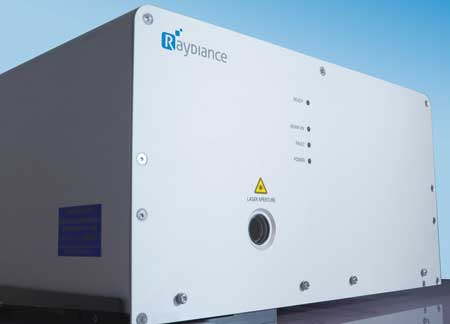
"Raydiance compact industrial grade all-laser manufacturing systems combine femtosecond laser technology with Raydiance's materials processing expertise and application-specific software," said a company spokesperson.
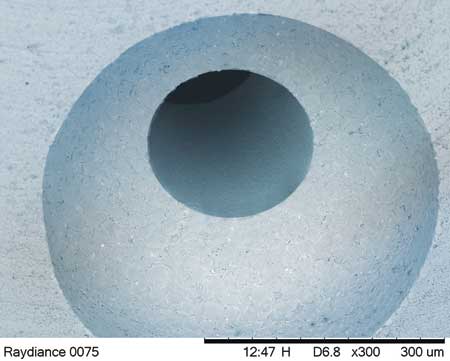
Close-up of GDi fuel injector micro hole drilled by Raydiance R-Drill in 316 SS.
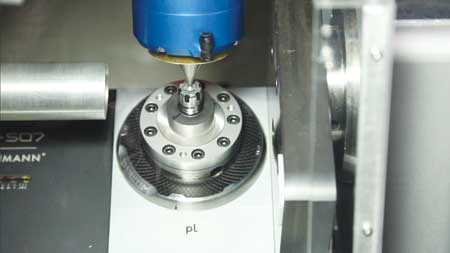
The Raydiance R-Drill enables diverse shape profile - including round, square or elliptical holes, and positive and negative tapers - drilling through materials < 1 second per hole for typical geometries.
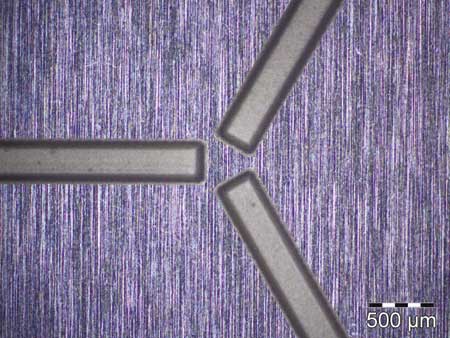
The Raydiance R-Mill creates milled slots in 316 SS without post processing.
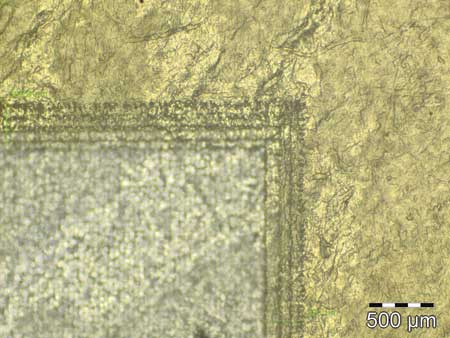
The Raydiance R-Mill enables highly specialized non-contact processing and surface texturing or smoothing of delicate materials such as pericardial tissue used for heart valve replacement applications.
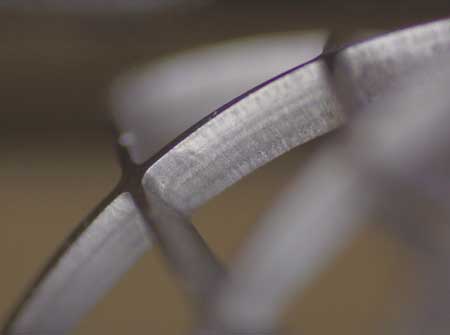
Tube Nitinol Stent: Nitinol stent made with the Raydiance R-Tube all-laser precision manufacturing system - no post processing required.
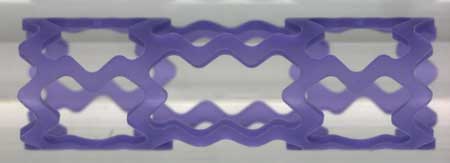
The Raydiance R-Tube processes composites, polymers and metals to create arterial and peripheral stents with enhanced strut-to-strut consistency.
Raydiance's R-Drill, R-Tube and R-Mill are designed to address micromachining challenges in the automotive, industrial and medical device industries. "Ready to integrate into customer manufacturing lines, the new solutions increase yield and improve production efficiency by optimizing factory workflow to eliminate expensive post-processing steps and achieve part-to-part consistency," said a company spokesperson. "R-Drill, R-Tube and R-Mill combine Raydiance's femtosecond laser technology with the company's materials processing expertise and application-specific software."
Raydiance products are designed to reduce cost per part by 20% to 50%. "They enable a major shift in product design and development by reducing prototyping and production transfer from months to as little as 24 hours," said the spokesperson. Customer applications include precision nozzles for automotive engine fuel injectors, cooling micro holes for power generation turbine blades, texture surfacing for biomedical implants (e.g. knee, hip and ear) and cutting of peripheral and cardiovascular stents.
According to the company, all Raydiance products:
- Increase factory output with compact, industrial grade, all-laser manufacturing technologies that enable high levels of automation
- Eliminate heat-affected zone (HAZ) damage to parts that require expensive post processing
- Reduce or eliminate internal process development using pre-loaded Raydiance designed processing instructions for the laser and material handling workstations
- Speed application development and time-to-market with 24-hour print-to-part software.
Raydiance technologies consist of:
- Raydiance laser(s)
- Raydiance-selected scanner(s)
- Raydiance-selected work station(s)
- Raydiance materials processing expertise delivered via proprietary control software.
According to the company, the R-Tube enables medical device manufacturers to:
- Achieve strut-to-strut consistency in nitinol or polymer arterial and peripheral stents without the need for post processing. Conventional picoseconds or nanosecond laser manufacturing methods often require multiple steps to correct processing defects, adding time and cost.
- Eliminate interior dimension (I.D.) honing, acid etch and bead blasting steps typical of other stent manufacturing processes, thereby delivering greater ROI.
- Expand stent material choices and new features, such as cutting-edge polymers for drug eluting stents with new drug retention reservoirs.
According to the company, the R-Drill enables industrial and medical manufacturers to:
- Capture production savings by drilling faster (< 1 sec through 1.2 mm 316 SS) through thicker materials than previous Raydiance commercial offerings.
- Produce parts with intricate hole features not previously possible in an all-laser manufacturing process, including perfectly round holes, elliptical holes, square holes, positive and negative tapers, micron-sized entrance and exit features, and holes that alter shape and profile from the top to the bottom of the part.
- Eliminate months of iterative machine shop-based prototyping of new parts (e.g. gas direct fuel injector nozzles) with Raydiance's 24-hour print-to-part software.
According to the company, the R-Mill addresses difficult micromachining challenges, enabling manufacturers to:
- Resurface or retexture delicate materials, such as pericardial tissue used for heart valve applications or polymer-based catheter balloons to impart flexibility features and control movement.
- Introduce precision slots, grooves, tapers and edge effects to virtually any material or part including microfluidic applications.
- Optimize production economics through manipulations of process and material-specific variables, such as milling speed, ablation depth and milling pattern repetition.
Commercial Application Examples
- R-Tube for design and production of minimally invasive medical devices: Customers utilize strut-to-strut consistency (+/- 4 microns) and kerf taper delivered by the R-Tube for production of coronary artery stents. In the R&D lab, Raydiance expertise helps customers design intricate parts and associated production methods. The Raydiance femtosecond all-laser approach achieves precision geometries for nitinol, poly-l-lactic acid (PLLA) polymer and other heat-sensitive medical device materials, eliminating HAZ damage and additional processing steps, and significantly accelerating time to production, according to the company.
- R-Drill for design and production of GDi nozzles:
"Automobile manufacturers are ramping utilization of GDi in next-generation engines to capture 20% to 30% fuel savings and realize higher emissions reductions amidst increasing regulations," said the spokesperson. "Prototyping time for new nozzle designs is reduced from weeks in the machine shop to 24 hours with the R-Drill, accelerating design optimization and time to market. In addition, the R-Drill solution enables Raydiance customers to reduce drilling time by approximately 30% while increasing yield to nearly 100%. The yield result is directly related to the part-to-part consistency delivered by the R-Drill, and there is no need for expensive post-processing to correct HAZ damage."
- R-Mill for design and production of micro features in medical device designs:
Medical device designers and process engineers utilize Raydiance technology to create micron-scale, complex features in medically relevant materials. According to the company, the R-Mill enables highly specialized, non-contact processing of pericardial tissue for heart valve replacements, resurfacing of catheter balloons to create micron-scale uniformity, and precision placement of slots and grooves in microfluidic applications. Milling pericardial tissue on an athermal basis leaves material mechanically flexible, while creating a smooth transition between plains.
The R-Tube, R-Drill and R-Mill are turnkey and installed in partnership with Raydiance's selected system integrators. Each system can be continuously monitored by Raydiance, with performance adjustments and preventative maintenance performed remotely as needed.
For more information contact:
Raydiance Inc.
1450 North McDowell Blvd.
Petaluma, CA 94954
707-559-2100
websales@raydiance.com
www.raydiance.com